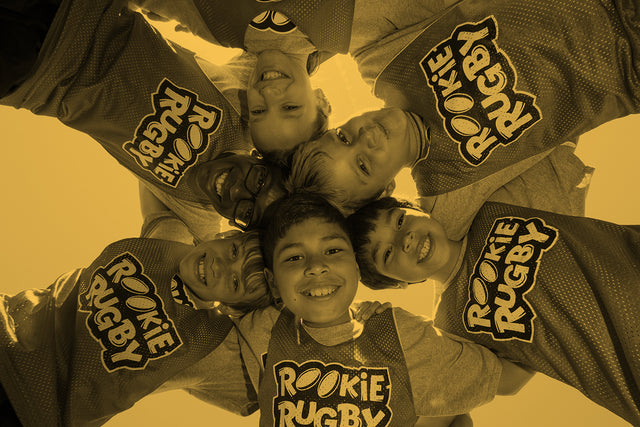Rookie Rugby sees Meteoric rise in participation numbers in Canada
Written by: Doug Crosse
For many years the lament of fans of Canadian rugby when the national team would square off with the likes of England, Australia or New Zealand, was that Canadian players could not compete against nations that have the sport in their collective DNA by having players as young as 5 taking up the sport.
And while the success of the sport at the high school level for both males and females has been encouraging for the past couple of decades, the fact that players don’t touch a rugby ball until they are in their teens has long been a troubling statistic for developers of the sport in Canada.
But now, thanks to support from corporate Canada, and with implementation by Rugby Canada, HSBC “Rookie Rugby” –sponsored by Honda – has begun laying the foundation among the very young athletes in Canada, through school and community-based programs.
The concept sees ‘rugby packages’ delivered to key stakeholders in the primary/middle school stream across Canada. These packages contain basic equipment including balls, cones, pinnies, and instructions for teachers to introduce the basics of the sport. The curriculum includes teaching resources available as downloadable PDFs.

The idea is to introduce the game of rugby using flag belts, allowing children to learn the nuances of rugby in a non-contact format.
Erin Kennedy, Mass Participation Program Consultant for Rugby Canada, fostered the introduction of the program through its first stages of roll-out in 2015 and is now working to expand the program to bring rugby to new participants across Canada.
Following those successful pilot programs in 2015, she says in its first full year in 2016, over 90,000 kids touched a rugby ball for the first time through various Rookie Rugby programs.
And it appears this year’s numbers will be eclipsed, as she says “we are on track to surpass that number with already 80,000 through the first nine months of this year.”

While it is not realistic to expect a young boy or girl touching a rugby ball for the first time as a five or six year old to then go on to national team glory, it is reasonable, through that exposure, to possibly divert them from soccer, hockey or baseball, which are the staples of the Canadian amateur team sports diet. The hope is that as the athletes progress, the basic skills they learn along the way will allow them to flourish as their instruction increases later in life, without the burden of learning rugby from scratch at age thirteen or fourteen.
A popular analogy in Canada is street hockey. Few would lay the claim that a pickup game of street hockey will net the next Connor McDavid, but Connor McDavid will certainly point to his youthful times yelling ‘car’ as the nets are laid aside as being part of his quintessential development of hockey skills.
On its website, Rookie Rugby outlines the various methods to introduce the sport. They range from having a Multi-sport day to one-day camps or clinics, right up to the development of flag rugby leagues.
Kennedy says a big part of Rookie Rugby’s success is not relying on someone with rugby knowledge to deliver the program. Indeed, the model sees implementation through community, school and rugby club delivery methods.
“We have written the curriculum for the parents, the teacher, etc., and you do not have to have rugby knowledge to get the kids playing rugby,” she says. “We are building the games around existing tag-based games, but incorporating ball handling and running skills.”
And flag rugby is really considered the gateway to extending a young player’s interest to the secondary school level. Contact is typically not introduced until the last year of middle school or the first year of high school. Until then, it's about running, passing and creating space, the fundamental building blocks of the sport.
The province of Saskatchewan and its school board have endorsed the Rookie Rugby program as part of its curriculum, where thousands of boys and girls can play rugby in organized gym classes, creating a generation of kids familiar with the sport and what it has to offer, from an early age.
Kennedy, who has delivered this program in the USA as well as various Caribbean nations, is thrilled with how the program is being accepted in Canada, partly because it is great to teach kids new things, but also breaking down barriers with possibly risk-averse parents.

“Rookie Rugby is great because we are changing the stereotype", she explains. “We are going to teach you how to pass, touch the ball, score in an environment that is safe and fun, which is a big selling point with parents experiencing rugby for the first time.”
With all the provinces offering up local contacts, it is a program that has gone from a fledgling idea to national traction in a few short years. If you would like to introduce Rookie Rugby in your community or school system visit the Rookie Rugby website at RookieRugby.ca


